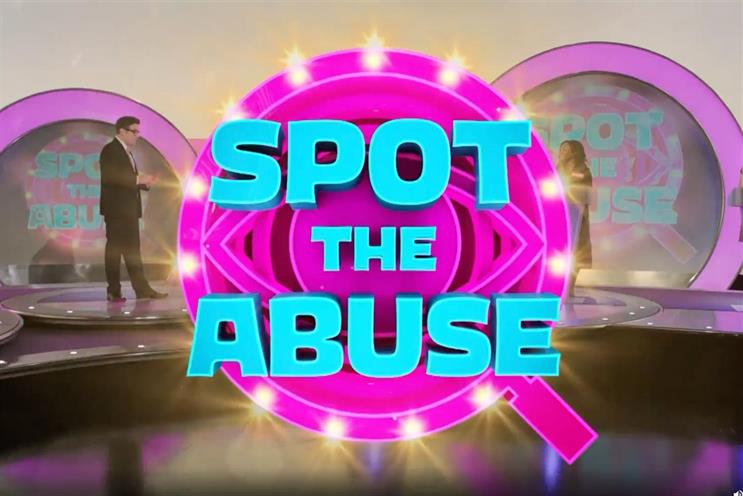Overlit, abused women sadly stuttering "Yes that's OK, right?" to a studio audience's frowns; a white male quiz show host smugly smiling as he describes how "your partner won't let you have a bank account", and rubs their faces into their ignorance.
Since I saw the Women's Aid "Spot the abuse" ad last week, I’ve been thinking about it. A lot. It’s made me uncomfortable and angry. Every now and again that’s a good comms strategy. Not in this case.
The video was released to help raise awareness of the different signs of domestic violence and abuse. It uses the creative vehicle of a cheesy game show (Spot the Abuse) to land questions and answers around controlling behaviours in an arresting and memorable way. I think it does just that. And for me, that’s the issue.
While the game show is an arresting concept, I think it falls short of its ambition to effect deeper change. And it falls short perhaps precisely because, to work, the quiz show creative construct dictates certain codes and power dynamics that end up doing a tragic disservice to the cause, working against women, rather than in support of them.
Let’s look at who’s on set...
Some vacuous, clueless women getting it all wrong in front of an audience...
How is this portrayal of victims of abuse not a pure form of victim-blaming and public shaming?
How is putting them on the spot and making the answers sound so obvious an empathetic reflection of the reality of insidious and indiscernible abuse that the ad is trying to denounce? It makes it sound like the problem with domestic abuse is women not being savvy enough to recognise it when they’re victims, rather than their partners abusing them.
How is it helpful or even relevant to put women in competition for the right answer, when we need only compassion and solidarity?
How is it even right to let victims of abuse embarrass themselves when the only people who should be put on the spot are abusers?
“No help from the studio audience with this,” the host says. And this is exactly how it feels: an excruciating isolation of victims of abuse, who are not only expected to know the difference, they’re also always suspected of not wanting their situation to change. (“How didn’t she see it?” “Why didn’t she leave?”).
And this male host... Am I the only one who just wants him to shut up and disappear? At what point was it decided that it was a good idea to have someone like him mansplaining abuse to women?
Oh, and, of course, the abusers... How is it OK to let the abusers sit quietly in the crowd, in the comfort of the majority and the ambiguity of the moral high ground, judging the contestants? Instead of making us look at abusers as crime perpetrators, we’re made to look at them with compassion – oh look, it’s just Kate’s partner, feeling slightly awkward. It perpetuates the view that abusers are just misguided.
By the way, I do understand that the style the ad went for is an absurd irony in order to stand out.
But the real irony of this execution is that instead of using humour to expose abuse, it ends up reinforcing the systemic underlying issue.
In fact, the entire game show could be a social commentary on how patriarchy keeps victim blaming, infantilising, isolating women, always putting the onus on them to solve their own issues as individuals, rather than systemic, and assuming it’s as easy to exit an abusive relationship as it is a game show.
The show ends with a rushed “Well, that is about all we’ve got time for today!”, and for me, this is a summary of this piece of film. No time has been allowed for empathy, subtlety or victim support.
There was only enough time to make people sit up, cheer and move on. And this is how this execution also feels. Rushing to an answer when it is critical to understand the deeper underlying issues and experiences, to avoid treating them superficially.
The game show was seductively simple, but it ends up dramatically oversimplifying and trivialising the issue and undermining women.
Effecting societal change for good is the hardest thing – because the longer-term impact should never be forgotten while trying to get to a short-term answer.
It’s worth saying that I work in advertising, too. I know how hard it is to make people care. And how extra hard it is to make them care about deeply uncomfortable issues, having to melt their acquired self-defence mechanisms. But I think there’s a responsibility in how we make people care.
And although it’s hard, I do want to believe that it’s possible to create work that makes people care, while caring about people in the first place.
The YouTube video hasn’t enabled comments, so it’s hard to know what people feel about it. So, while I genuinely hope that this will manage to make people aware of different types of abuse, I can’t shake the feeling that, at a time where a series like Maid (Netflix) is finally showing the reality of abuse in all its complexity to a mainstream audience, "Spot the abuse" is a step backwards.
Margaux Revol is a strategy partner at Abbott Mead Vickers BBDO


